最全面人教版九年级全册英语第二单元知识点归纳总结
人教版英语九年级全一册unit2笔记
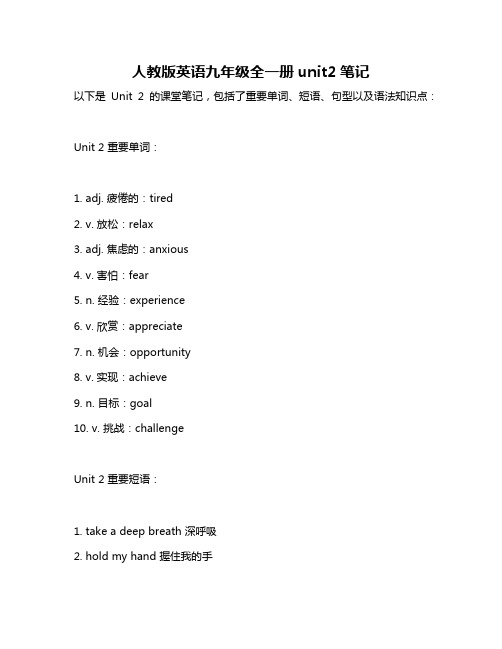
人教版英语九年级全一册unit2笔记以下是Unit 2的课堂笔记,包括了重要单词、短语、句型以及语法知识点:Unit 2 重要单词:1. adj. 疲倦的:tired2. v. 放松:relax3. adj. 焦虑的:anxious4. v. 害怕:fear5. n. 经验:experience6. v. 欣赏:appreciate7. n. 机会:opportunity8. v. 实现:achieve9. n. 目标:goal10. v. 挑战:challengeUnit 2 重要短语:1. take a deep breath 深呼吸2. hold my hand 握住我的手3. calm down 冷静下来4. get butterflies in my stomach 心头鹿撞5. worry about 为...担心6. be nervous about 对...感到紧张7. be anxious about 对...感到焦虑8. be scared of 对...感到害怕9. look forward to 盼望,期待10. in the future 在未来Unit 2 重要句型:1. I feel tired these days. (现在时态,描述当前状态)2. I was really nervous before the big speech. (过去时态,描述过去发生的动作)3. I will challenge myself to do things I didn't think I could do before. (将来时态,描述将来的动作)4. It's important to learn how to deal with stress. (形式主语,强调某事的重要性)5. I look forward to hearing from you. (固定句型,表示期待)6. I have a goal to achieve. (动词不定式作后置定语,表示目标)7. It's a waste of time doing sth. (动名词作主语,表示某事是浪费时间)8. I'm sorry to hear that you're feeling down. (固定句型,表示同情或安慰)9. The best way to relax is through exercise. (动词不定式作后置定语,表示放松的最好方式)10. I will try my best to get the job. (动词不定式作目的状语,表示努力) Unit 2 语法知识点:1. 现在完成时态(Present Perfect Tense):用于描述过去发生的动作对现在的影响或结果。
人教版九年级英语第二单元知识点梳理

人教版九年级英语第二单元知识点梳理Unit 2 I think that moon cakes are delicious!一、短语:1.the Lantern Festival元宵节2.the Dragon Boat Festival端午节3.the Water Festival泼水节4.remind sb.of使某人想起5.eat five meals a day一天吃五餐6.put on five pounds体重增加了五磅7.treat sb.with.用/以……对待某人8.be similar to...与.......相似9.end up最终成为/处于10.share sth.with sb.与……分享……11.as a result结果12.one...the other...(两者中的)一个…另一个…13.take sb.out for dinner带某人出去吃饭14.dress up乔装打扮15.haunted house鬼屋16.the beginning of new life新生命的开始二、知识点:1.宾语从句:(三大考点:引导词、时态和语序。
)宾语从句在复合句中作主句的宾语,由连接词+主语+谓语构成,常由下面的这些词引导:①由that引导,表示陈述意义,that可省略:He says(that)he is at home.他说他在家里。
②由if或whether引导,表示一般疑问意义(带有是否、已否、对否等):I don’t know if/whether Wei Hua likes fish.我不知道韦华是否喜欢鱼。
③由连接代词、连接副词(疑问词)引导,表示特殊疑问意义:Do you know what he wants to buy?你知道他想要买什么吗?④从句时态要与主句一致:当主句是一般现在时,从句根据情况使用任何时态;当主句是一般过去时,从句应使用过去某时态(一般过去时,过去进行时,过去将来时,过去完成时)He said(that)he was at home.他说他在家里。
人教版九年级英语全一册:Unit 2 语法知识点复习提纲(全面,必备!)
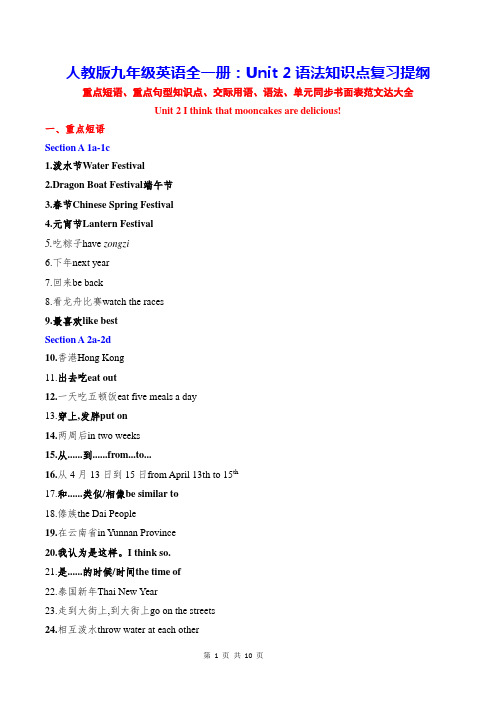
人教版九年级英语全一册:Unit 2语法知识点复习提纲重点短语、重点句型知识点、交际用语、语法、单元同步书面表范文达大全Unit 2 I think that mooncakes are delicious!一、重点短语Section A 1a-1c1.泼水节Water Festival2.Dragon Boat Festival端午节3.春节Chinese Spring Festival4.元宵节Lantern Festival5.吃粽子have zongzi6.下年next year7.回来be back8.看龙舟比赛watch the races9.最喜欢like bestSection A 2a-2d10.香港Hong Kong11.出去吃eat out12.一天吃五顿饭eat five meals a day13.穿上,发胖put on14.两周后in two weeks15.从......到......from...to...16.从4月13日到15日from April 13th to 15th17.和......类似/相像be similar to18.傣族the Dai People19.在云南省in Yunnan Province20.我认为是这样。
I think so.21.是......的时候/时间the time of22.泰国新年Thai New Year23.走到大街上,到大街上go on the streets24.相互泼水throw water at each other25.each other/one another彼此,互相26.是用来......的时间be a time for27.冲走,洗掉,冲洗wash away28.拥有好运have good luck29.在新的一年里in the new yearSection A 3a-3c30.庆祝中秋节celebrate the Mid-autumn Festival31.中秋节Mid-autumn Day/Festival32.吃月饼enjoy mooncakes33.呈......的形状be in shape of34.一轮满月a full moon35.寄托着对......的祝愿/祝福carry people’s wishes to36.传统的民间故事traditional folk stories37.射下shoot down38.仙药,仙丹,魔药magic medicine39.永生,长生不老live forever40.飞到/向月球fly up to the moon41.如此......以至于......so ...that...42.对着......呼喊/喊叫某人的名字call out sb’s name to43.摆开,布置lay out44.在花园in the garden45.回来come back46.此后,之后after this47.......的传统the tradition of48.赏月admire the moon49.和某人品/吃月饼share mooncakes with sb.50.在地球上on the earth51.在夜里at night52.结果as a resultSection A Grammar Focus-4c53.举行龙舟,比赛have the races54.dragon boat team龙舟队55.......的好时候/间be a good time56.龙舟,龙船dragon boats57.回家come home58.母亲节Mother’s Day59.在五月的第二个星期天on the second Sunday of May60.父亲节Father’s Day61.在六月的第三个星期天on third Sunday of June62.给每人送礼物give gifts to sb.63.普通的礼物common gifts/presents64.庆祝母亲节celebrate Mother’s Day65.庆祝父亲节celebrate Father’s Day66.在中国in China67.在那边over there68.送给某人类似的礼物give similar gifts to sb.69.必须,不得不have to70.花大量的钱spend a lot of money71.好主意great/good ideaSection B 1a-1d72.乔装,打扮dress up73.鬼屋haunted house74.黑猫black cat75.不请吃就捣蛋trick or treat76.庆祝万圣节,过万圣节celebrate Halloween77.认为,考虑,思考,想到think of78.关闭turn off79.关灯turn off the lights80.把......放在门边put...around the door81.装扮成dress up as82.卡通人物/角色cartoon characters83.附近的街区around the neighborhood84.要求,询问,要ask for85.捉弄某人play a trick on/upon86.招待某人give sb. a treat87.了解learn aboutSection B 2a-2e88.《圣诞赞歌》A Christmas Carol89.圣诞节的精神/真谛the spirit of Christmas90.圣诞树Christmas trees91.圣诞老人Santa Claus92.在于/存在于......的真谛lie the true meaning of93.......的重要性the importance of94.......的最好范例/典范/榜样/例子the best example of95.短篇小说short novel96.考虑自己,自私think about oneself97.关心,在乎care about98.圣诞节前夕Christmas Eve99.......的鬼魂/魂魄the ghost of......100.合伙人,生意伙伴business partner101.最终成为end up102.改变某人的生活方式change one’s way103.圣诞节过去之灵/精灵/魂the Ghost of Christmas Past 104.把某人带回到take sb. back to105.让某人想起remind sb. Of106.圣诞节现在之魂/精灵/灵the Ghost of Christmas Present 107.带某人去......take sb. to ...108.最后一个the last one109.圣诞节未来(将来)之灵/精灵/魂the Ghost of Christmas Yet 110.睡醒,唤醒wake up111.找出,找到,查明find out112.第二天早上the next morning113.圣诞节Christmas Day114.圣诞节快乐Merry Christmas115.在危难中,在危急中,急需,需要in need116.改变某人的生活chang e one’s life117.......的精神/真谛the true spirit of118.圣诞节的真谛/的真正精神the true spirit of Christmas Day119.有很多的朋友have a lot of friendsSection B 3a-Self Check120.西方国家Western countries121.庆祝复活节celebrate Easter122.在......之间between ...and...123.新生命的诞生/开始the beginning of new life124.下蛋lay out125.孕育生命give birth to life126.新生命的象征be a symbol of new life127.不但......而且.....not only...but also...128.分发,散发give out=hand out129.到处分散,到处传播spread ...around130.create good business for为......带来/创造良好的生意二、重点句型知识点Section A标题句型1.I think that mooncakes are delicious!我认为月饼很美味。
Unit2单元知识梳理2022-2023学年人教版九年级全册
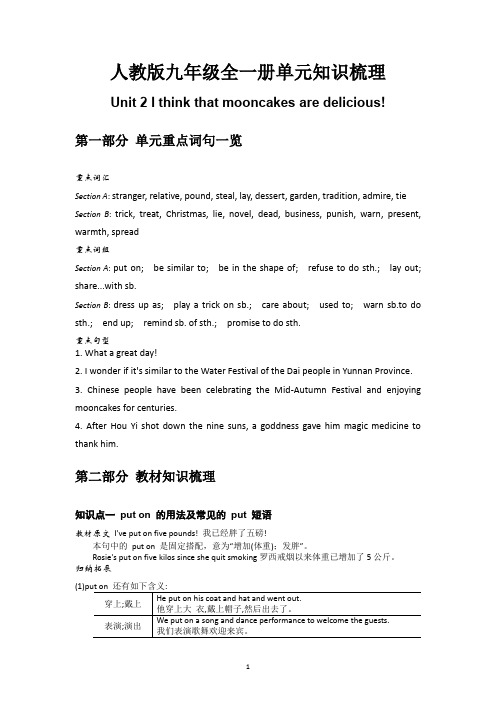
人教版九年级全一册单元知识梳理Unit 2 I think that mooncakes are delicious!第一部分单元重点词句一览重点词汇Section A: stranger, relative, pound, steal, lay, dessert, garden, tradition, admire, tie Section B: trick, treat, Christmas, lie, novel, dead, business, punish, warn, present, warmth, spread重点词组Section A: put on; be similar to; be in the shape of; refuse to do sth.; lay out; share...with sb.Section B: dress up as; play a trick on sb.; care about; used to; warn sb.to do sth.; end up; remind sb. of sth.; promise to do sth.重点句型1. What a great day!2. I wonder if it's similar to the Water Festival of the Dai people in Yunnan Province.3. Chinese people have been celebrating the Mid-Autumn Festival and enjoying mooncakes for centuries.4. After Hou Yi shot down the nine suns, a goddness gave him magic medicine to thank him.第二部分教材知识梳理知识点一put on 的用法及常见的put 短语教材原文I've put on five pounds! 我已经胖了五磅!本句中的put on 是固定搭配,意为“增加(体重);发胖”。
九年级英语人教版第二单元

人教版九年级英语第二单元知识点总结一、重点词汇解析1.mooncake /ˈmuːnkeɪk/ 月饼-解析:由moon(月亮)和cake(蛋糕)组成,是中秋节的传统食品。
-例句:We eat mooncakes on Mid-Autumn Festival.(我们在中秋节吃月饼。
)ntern /ˈlæntən/ 灯笼-解析:一种照明工具,通常在节日中使用。
-例句:There are many beautiful lanterns in the park.(公园里有很多漂亮的灯笼。
)3.stranger /ˈstreɪndʒə(r)/ 陌生人-解析:不认识的人。
-例句:Don't talk to strangers.(不要和陌生人说话。
)4.relative /ˈrelətɪv/ 亲属;亲戚-解析:和自己有血缘或婚姻关系的人。
-例句:We visited our relatives during the holiday.(我们在假期拜访了亲戚。
)5.put on 增加(体重);发胖-解析:指身体的重量增加。
-例句:She has put on some weight.(她长胖了一些。
)y /leɪ/ 放置;安放;产(卵);下(蛋)-解析:过去式和过去分词分别为laid /leɪd/。
-例句:She laid the book on the table.(她把书放在桌子上。
)二、重点短语1.the Water Festival 泼水节-解析:一些国家和地区的传统节日。
-例句:The Water Festival is very lively.(泼水节非常热闹。
)2.the Dragon Boat Festival 端午节-解析:中国的传统节日,有赛龙舟、吃粽子等习俗。
-例句:We eat zongzi on the Dragon Boat Festival.(我们在端午节吃粽子。
)3.the Spring Festival 春节-解析:中国最重要的传统节日。
人教版新目标初中英语九年级全一册 知识点总结2单元
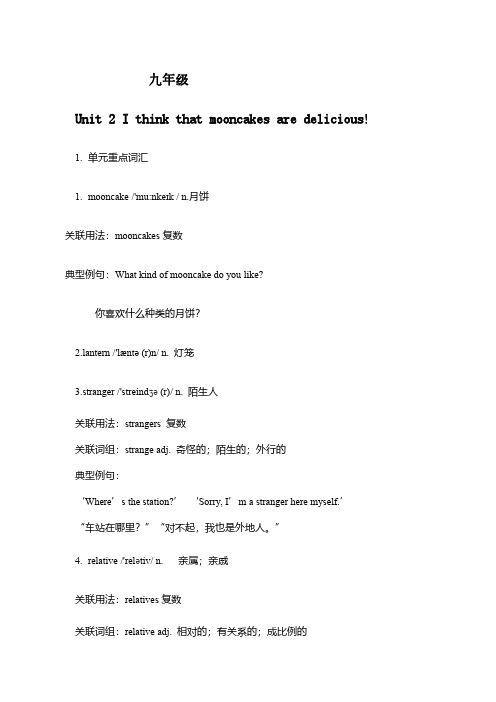
九年级Unit2I think that mooncakes are delicious!1.单元重点词汇1.mooncake/'mu:nkeɪk/n.月饼关联用法:mooncakes复数典型例句:What kind of mooncake do you like?你喜欢什么种类的月饼?ntern/'læntə(r)n/n.灯笼3.stranger/'streindʒə(r)/n.陌生人关联用法:strangers复数关联词组:strange adj.奇怪的;陌生的;外行的典型例句:‘Where’s the station?’‘Sorry,I’m a stranger here myself.’“车站在哪里?”“对不起,我也是外地人。
”4.relative/'relətiv/n.亲属;亲戚关联用法:relatives复数关联词组:relative adj.相对的;有关系的;成比例的5.put on增加(体重);发胖关联用法:put on:穿上;上演;增加;假装;使…上场关联词组:put away储存(钱);储存…备用;储蓄put back拨回;向后移put down写下;记下;镇压put forward提出(意见、建议)put in打断;插嘴put off延期;推迟典型例句:She put on her coat and went out.她穿上外套,出去了。
Inactive people often put on weight later in life.不好动的人常常会在今后的生活中发胖。
6.pound/paund/n.磅(重量单位);英镑7.folk/fəul k/adj.民间的;民俗的8.goddess/'gɔdes/n.女神9.whoever/huːˈevə/pron.无论谁;不管什么人关联用法:whoever可以写成no matter who典型例句:I’ll take whoever wants to go.谁想去我就带谁去。
人教版九年级英语全册Unit2知识点
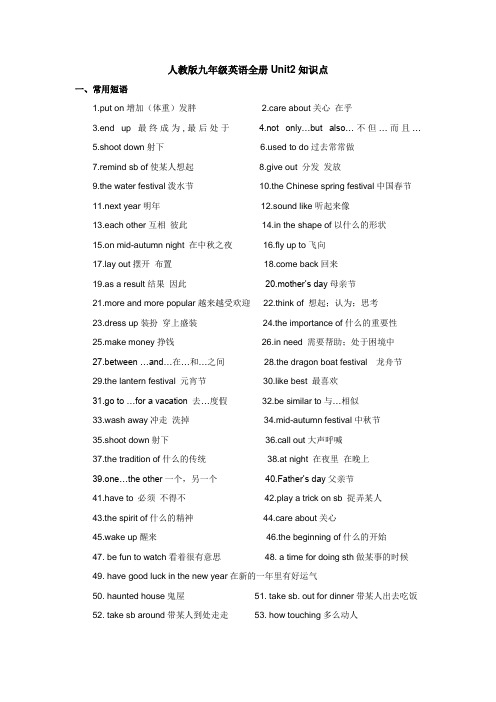
人教版九年级英语全册Unit2知识点一、常用短语1.put on增加(体重)发胖2.care about关心在乎3.end up最终成为,最后处于4.not only…but also…不但…而且…5.shoot down射下ed to do过去常常做7.remind sb of使某人想起8.give out 分发发放9.the water festival泼水节10.the Chinese spring festival中国春节11.next year明年12.sound like听起来像13.each other互相彼此14.in the shape of以什么的形状15.on mid-autumn night 在中秋之夜16.fly up to飞向y out摆开布置e back回来19.as a result结果因此20.mother’s day母亲节21.more and more popular越来越受欢迎22.think of 想起;认为;思考23.dress up装扮穿上盛装24.the importance of什么的重要性25.make money挣钱26.in need 需要帮助;处于困境中27.between …and…在…和…之间28.the dragon boat festival 龙舟节29.the lantern festival 元宵节30.like best 最喜欢31.go to …for a vacation 去…度假32.be similar to与…相似33.wash away冲走洗掉34.mid-autumn festival中秋节35.shoot down射下36.call out大声呼喊37.the tradition of什么的传统38.at night 在夜里在晚上39.one…the other一个,另一个40.Father’s day父亲节41.have to 必须不得不42.play a trick on sb 捉弄某人43.the spirit of什么的精神44.care about关心45.wake up醒来46.the beginning of什么的开始47. be fun to watch看着很有意思48. a time for doing sth做某事的时候49. have good luck in the new year在新的一年里有好运气50. haunted house鬼屋51. take sb. out for dinner带某人出去吃饭52. take sb around带某人到处走走53. how touching多么动人二、短语用法集锦感叹句式一:What+(a/an)+adj.+名词(+主语+谓语+其他)!多么…的…感叹句式二:How +adj./adv.+主语+谓语+其他!…多么…!2. make sb. do sth. 让某人做某事3. give sb. sth. 给某人某物4. plan to do sth. 计划做某事5.refuse to do sth. 拒绝做某事6.one of +名词复数形式…之一7. used to be过去是…8. it +is+名词+动词不定式(to do sth.)做某事是…9. what …think of…?认为…怎么样?10. in+时间段在……后11.warn sb.(not)to do sth.告诫某人做某事12.tell sb.(not)to do sth. 告诉某人做某事13.decide to do sth 决定做某事14.promise to do sth 承诺、答应做某事三、重点语法1.宾语从句a.陈述语序(that)b.一般疑问句(if 或whether)c.特殊疑问句(5w,1h)可跟that从句做宾语的动词:say, think, insist, wish, hope, demand, imagine, wonder, know, see, believe, agree, admit, deny, expect, explain, order, command, feel, dream, suggest, hear, mean, notice, prefer, request, require, propose, declare, report等例:I don’t know what they are looking for.Could you tell me when the train will leave?注意:当主句谓语动词是think, believe, suppose, expect 等词,而宾语从句的意思是否定时,常把否定转移至主句表示。
人教版九年级unit2知识点

人教版九年级unit2知识点九年级英语知识点总结Unit 2在九年级英语课程的第二单元中,我们学习了许多重要的知识点。
本文将对这些知识点进行总结和回顾,以帮助大家更好地复习和巩固所学内容。
一、动词时态与语态1. 一般现在时:表示经常性或习惯性的动作或状态。
eg. She often goes to the park on weekends.2. 现在进行时:表示现阶段正在进行的动作。
eg. They are watching a movie in the cinema.3. 一般过去时:表示过去某个时间发生的动作或存在的状态。
eg. Yesterday, I visited my grandparents.4. 过去进行时:表示过去某个时间正在进行的动作。
eg. We were playing football in the park when it started to rain.5. 一般将来时:表示将来某个时间会发生的动作或存在的状态。
eg. They will have a picnic next Sunday.6. 被动语态:表示动作的接受者重要于动作的执行者。
eg. The book was written by Mark Twain.二、形容词与副词比较级与最高级1. 比较级:用来比较两个事物的程度,常在形容词前加-er或在副词前加more。
eg. This book is more interesting than that one.eg. She runs faster than me.2. 最高级:用于比较多于两个事物的程度,常在形容词前加-est或在副词前加most。
eg. It was the most beautiful sunset I have ever seen.三、名词所有格1. 名词所有格表示所属关系,一般在名词后加's。
eg. This is Mary's pencil.2. 若名词是复数形式且以-s结尾,则只需在末尾加'。
人教版九年级英语第二单元知识点总结
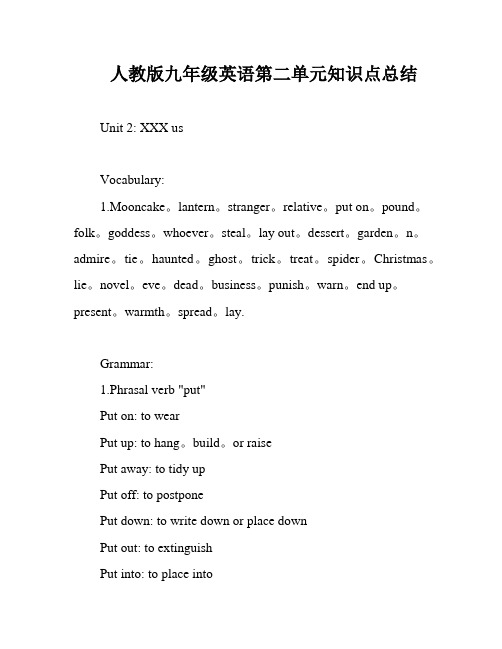
人教版九年级英语第二单元知识点总结Unit 2: XXX usVocabulary:1.Mooncake。
lantern。
stranger。
relative。
put on。
pound。
folk。
goddess。
whoever。
steal。
lay out。
dessert。
garden。
n。
admire。
tie。
haunted。
ghost。
trick。
treat。
spider。
Christmas。
lie。
novel。
eve。
dead。
business。
punish。
warn。
end up。
present。
warmth。
spread。
lay.Grammar:1.Phrasal verb "put"Put on: to wearPut up: to hang。
build。
or raisePut away: to tidy upPut off: to postponePut down: to write down or place downPut out: to extinguishPut into: to place into2."Lay" verb formsXXX–lied–lied-lying: to tell a XXXXXX–lain-lying: XXXLay—laid–laid-laying: to place or lay eggs3."Admire" usageAdmire sb/sthXXXXXX.XXX.4."XXX" verb usageTie + n (e.g。
tie a tie)Present n = giftBe present: currently existingXXX adj: stingyXXX: XXXMean to do sth: plan to do sth5."Trick or XXX" usagePlay a trick on sb / play tricks on sbBe a time for doing sth / to do sthXXX a trick6."XXX" usage7."Warn sb (not) to do sth" usagePut…around… (e.g。
人教版九年级全一册英语第二单元知识点整理

九年级英语第二单元教学知识点梳理Unit 2 I think that mooncakes are delicious! 短语整理•put on 增加(体重);发胖•lay out 摆开;布置•end up 最终成为;最后处于•Water Festival 泼水节•Mid-Autumn Festival 中秋节•Dragon Boat Festival 端午节•Chinese Spring Festival 春节•Lantern Festival 元宵节•Mother’s Day母亲节•Father’s Da y 父亲节•eat out 外出就餐•call out 大声呼喊•admire the moon 赏月•dress up (as) 装扮(成)•give out 分发•traditional folk stories 传统民间故事•the spirit of ……的精神/意义用法讲解•put on增加(体重);发胖o I’ve put on five pounds!o put on 穿上;戴上:She put on her coat.•lay out 摆开;布置o She laid out the forks.•end up 最终成为;最后处于o“If you go on like this you’ll end up in prison.”——牛津词典•Water Festival 泼水节o I know that the Water Festival is really fun.•Mid-Autumn Festival 中秋节o How do people celebrate the Mid-Autumn Festival?•Mother’s Day 母亲节/ F ather’s Day 父亲节o I heard that it is becoming more and more popular to celebrate Mother’s Day and Father’s Day in China.•dress up (as) 装扮(成)o They dressed up as clowns at the party.•give out 分发o Not only do people spread them around in different hiding places for a egg hunt, but they also give out these treats as gifts.重点句子•People go on the streets to throw water at each other. 人们走上街头互相泼水。
人教版九年级全一册 第二单元知识点
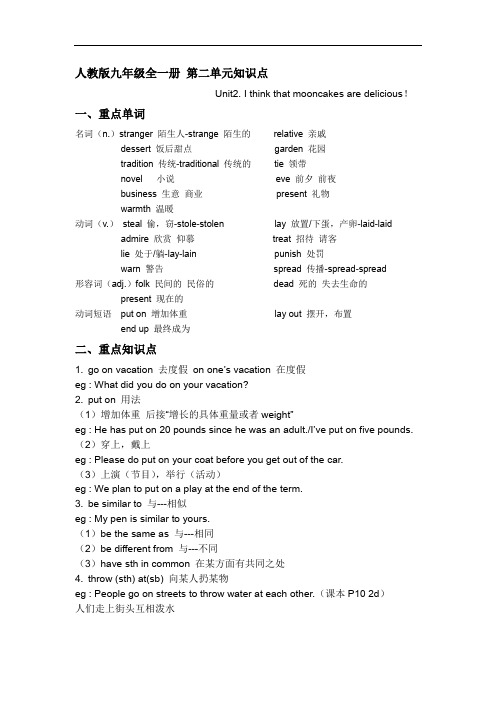
人教版九年级全一册第二单元知识点Unit2. I think that mooncakes are delicious!一、重点单词名词(n.)stranger 陌生人-strange 陌生的relative 亲戚dessert 饭后甜点garden 花园tradition 传统-traditional 传统的tie 领带novel 小说eve 前夕前夜business 生意商业present 礼物warmth 温暖动词(v.)steal 偷,窃-stole-stolen lay 放置/下蛋,产卵-laid-laid admire 欣赏仰慕treat 招待请客lie 处于/躺-lay-lain punish 处罚warn 警告spread 传播-spread-spread形容词(adj.)folk 民间的民俗的dead 死的失去生命的present 现在的动词短语put on 增加体重lay out 摆开,布置end up 最终成为二、重点知识点1. go on vacation 去度假on one’s vacation 在度假eg : What did you do on your vacation?2. put on 用法(1)增加体重后接“增长的具体重量或者weight”eg : He has put on 20 pounds since he was an adult./I’ve put on five pounds.(2)穿上,戴上eg : Please do put on your coat before you get out of the car.(3)上演(节目),举行(活动)eg : We plan to put on a play at the end of the term.3. be similar to 与---相似eg : My pen is similar to yours.(1)be the same as 与---相同(2)be different from 与---不同(3)have sth in common 在某方面有共同之处4. throw (sth) at(sb) 向某人扔某物eg : People go on streets to throw water at each other.(课本P10 2d)人们走上街头互相泼水5. wash away 冲走,冲刷eg : The new year is a time for cleaning and washing away bad things新年是清扫和洗去晦气的时候6. shoot down 射下击落(shoot -shot -shot)eg : The man shot down a bottle.常见的关于down 的短语:turn down 调低;拒绝break down 出故障cut down 砍倒calm down 冷静put down 放下write down7. steal - stole - stolen 偷窃取steal sth from ---eg : The thief has stolen more than 200 yuan .8. lay out 摆开,布置(lay -laid -laid laying)还有“产卵下蛋”之意eg : He quickly laid out her favorite fruits and desserts(饭后甜点)in the9. trick or treat(1)treat 名词款待eg : Let’s go out for dinner.My treat.(我请客)(2)v.动词treat sb to ---请某人吃---eg : I wonder if you want to treat me to dinner.(3)treat sb as/like ---把---当作---看待eg : They treat the cat as a member of their family.他们把这只猫当作他们家庭的一份子看待。
人教版九年级英语知识点汇总Unit 2
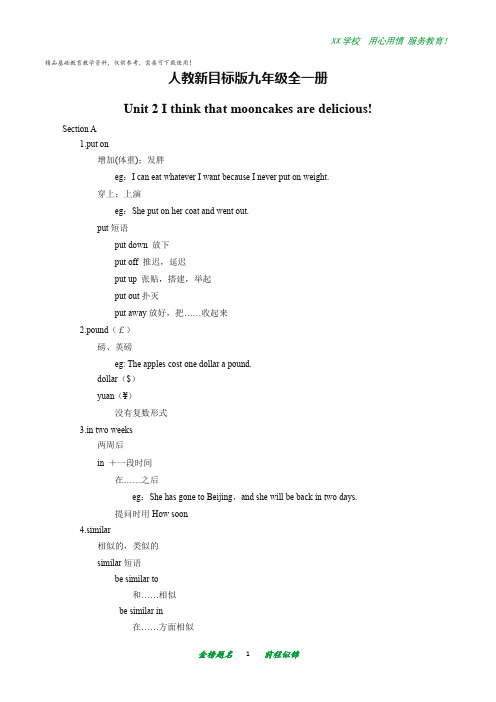
精品基础教育教学资料,仅供参考,需要可下载使用!人教新目标版九年级全一册Unit 2 I think that mooncakes are delicious!Section A1.put on增加(体重);发胖eg:I can eat whatever I want because I never put on weight.穿上;上演eg:She put on her coat and went out.put短语put down 放下put off 推迟,延迟put up 张贴,搭建,举起put out扑灭put away放好,把……收起来2.pound(£)磅、英磅eg: The apples cost one dollar a pound.dollar($)yuan(¥)没有复数形式3.in two weeks两周后in +一段时间在……之后eg:She has gone to Beijing,and she will be back in two days.提问时用How soon4.similar相似的,类似的similar短语be similar to和……相似be similar in在……方面相似the same as与……相同5.whoever无论谁;不管什么人=anybody that引导名词性从句eg:Whoever visits the town will be welcome.eg:Give it to whoever you like.6.steal偷;窃取steal sth. from从……偷某物eg:He stole some money from his mother.have sth. stolen(让)某物被偷eg:She had her purse stolen. =Her purse was stolen.7.refuse拒绝refuse to do sth.拒绝做某事refuse sth.拒绝某事y放置;安放;产(卵);下(蛋)过去式过去分词均为laideg:Lay out the map on the table and let's have a look.eg:My hen laid an egg last night.lie躺下过去式:lay过去分词:lain说谎过去式:lied过去分词:lied9.admire观赏,欣赏eg:Do you admire this picture?admire...for...因……而钦佩/赞赏……eg:We admire Ann for her courage.10.share分享;共享;分摊eg:There is only one bedroom, so we’ll have to share.share sth. with sb和某人分享或合用某物eg:I really want to share my happiness with you.11.宾语从句(一)定义:由一个句子充当宾语,这个句子就叫宾语从句常见关系词有:that,if,whether,what,who,where,why和how that无词义在口语或非正式文体中常省略eg:He said (that) he could finish his work beforewhether,if意思是“是否”只能用whether,不能用if介词后面eg:I'm thinking of whether we should go to see the film.与or not连用eg:I can't say whether or not they can come on time.否定否定前置主句中的主语是第一人称代词I或we谓语动词是think,believe,expect,guess,suppose等eg:I don't think that Jack can finish his homework by himself.12.感叹句what引导What+a/an+形容词+单数名词(+主语+谓语)eg:What an interesting story (it is)!What+形容词+复数名词(+主语+谓语)eg:What beautiful flowers (they are)!What+形容词+不可数名词(+主语+谓语)eg:What delicious food (it is)!how引导How+形容词(+主语+谓语)eg:How kind (the girl is)!How+副词(+主语+谓语)eg:How well (she dances)!How+主语+谓语eg:How time flies!Section B1.dress up乔装打扮;装扮dress up like/as...打扮成……eg: Alina dressed up as/like a boy.2.treatn.款待;招待v.招待;请(客)治疗eg:Which doctors are treating her for her illness?treat...as...把……看作……treat sb.to sth请某人吃某物3.care about关心,在意eg:She doesn't care about her husband at all.辨析care about强调因责任感而关心;在乎eg:Your mother truly cares about you.care for照料;照顾=take care ofeg:He has to care for his sister at home.喜欢= be fond of多用于疑问句和否定句4.dead死的;失去生命的eg:That is a dead dog.辨析deadadj.强调“死”的状态作表语或定语可以和时间段边用diev.强调“死”的瞬间动作不能和时间段连用deathn.死;死亡dyingdie的现在分词adj.垂死、要死用作定语或表语5.business公事;商业;生意不可数名词短语on business出差do business做生意business hours办公时间;营业时间6.punish处罚;惩罚句型punish sb. for...因……而处罚某人punish sb. with/by...处某人以……7.warnn.警告;告诫eg:He warned her to keep silent.他告诫她保持沉默8.end up最终成为;最后处于eg: The party ends up with a poem.句型end up in...以某种结局结束eg: If you don't listen to me, you will end up in failure.end up doing sth.以做某事结束eg: At first they hated each other, but they ended up getting married.end up +adj.以……结束eg: If he goes on driving like this, he will end up dead.9.expect期待;预料句型expect to do sth.期待做某事expect sb. to do sth.期待某人做某事expect + that 从句eg: I expect that I'll be back next Monday.10.presentn.现在;礼物at presenteg:I don't have any dictionary at present.adj.现在的eg:He doesn't feel satisfied with his present job.11.spreadv.传播;展开eg:CCTV 1 spread the news as soon as the accident happened.n.蔓延;传播eg: The spread of the disease frightened the villagers.12.give out用尽;分发用完,耗尽发出( 光、热、烟、雾)=give off宾语是代词时,要置于give 与out之间eg:Give them out, please.宾语是名词时,可置于副词之前或之后eg: He is giving out the papers to his classmates.Section A1.put on增加(体重);发胖eg:I can eat whatever I want because I never put on weight.穿上;上演eg:She put on her coat and went out.put短语put down 放下put off 推迟,延迟put up 张贴,搭建,举起put out扑灭put away放好,把……收起来2.pound(£)磅、英磅eg: The apples cost one dollar a pound.dollar($)yuan(¥)没有复数形式3.in two weeks两周后in +一段时间在……之后eg:She has gone to Beijing,and she will be back in two days.提问时用How soon4.similar相似的,类似的similar短语be similar to和……相似be similar in在……方面相似the same as与……相同5.whoever无论谁;不管什么人=anybody that引导名词性从句eg:Whoever visits the town will be welcome.eg:Give it to whoever you like.6.steal偷;窃取steal sth. from从……偷某物eg:He stole some money from his mother.have sth. stolen(让)某物被偷eg:She had her purse stolen. =Her purse was stolen.7.refuse拒绝refuse to do sth.拒绝做某事refuse sth.拒绝某事y放置;安放;产(卵);下(蛋)过去式过去分词均为laideg:Lay out the map on the table and let's have a look.eg:My hen laid an egg last night.lie躺下过去式lay过去分词lain说谎过去式lied过去分词lied9.admire观赏,欣赏eg:Do you admire this picture?admire...for...因……而钦佩/赞赏……eg:We admire Ann for her courage.10.share分享;共享;分摊eg:There is only one bedroom, so we’ll have to share.share sth. with sb和某人分享或合用某物eg:I really want to share my happiness with you.11.宾语从句(一)定义:由一个句子充当宾语,这个句子就叫宾语从句常见关系词有:that,if,whether,what,who,where,why和how that无词义在口语或非正式文体中常省略eg:He said (that) he could finish his work beforewhether,if意思是“是否”只能用whether,不能用if介词后面eg:I'm thinking of whether we should go to see the film.与or not连用eg:I can't say whether or not they can come on time.否定否定前置主句中的主语是第一人称代词I或we谓语动词是think,believe,expect,guess,suppose等eg:I don't think that Jack can finish his homework by himself.12.感叹句what引导What+a/an+形容词+单数名词(+主语+谓语)eg:What an interesting story (it is)!What+形容词+复数名词(+主语+谓语)eg:What beautiful flowers (they are)!What+形容词+不可数名词(+主语+谓语)eg:What delicious food (it is)!how引导How+形容词(+主语+谓语)eg:How kind (the girl is)!How+副词(+主语+谓语)eg:How well (she dances)!How+主语+谓语eg:How time flies!Section B1.dress up乔装打扮;装扮dress up like/as...打扮成……eg: Alina dressed up as/like a boy.XX学校用心用情服务教育!2.treatn.款待;招待v.招待;请(客)治疗eg:Which doctors are treating her for her illness?treat...as...把……看作……treat sb.to sth请某人吃某物3.care about关心,在意eg:She doesn't care about her husband at all.辨析care about强调因责任感而关心;在乎eg:Your mother truly cares about you.care for照料;照顾=take care ofeg:He has to care for his sister at home.喜欢= be fond of多用于疑问句和否定句4.dead死的;失去生命的eg:That is a dead dog.辨析deadadj.强调“死”的状态作表语或定语可以和时间段边用diev.XX学校用心用情服务教育!强调“死”的瞬间动作不能和时间段连用deathn.死;死亡dyingdie的现在分词adj.垂死、要死用作定语或表语5.business公事;商业;生意不可数名词短语on business出差do business做生意business hours办公时间;营业时间6.punish处罚;惩罚句型punish sb. for...因……而处罚某人punish sb. with/by...处某人以……7.warnn.警告;告诫eg:He warned her to keep silent.他告诫她保持沉默8.end up最终成为;最后处于eg: The party ends up with a poem.句型end up in...以某种结局结束eg: If you don't listen to me, you will end up in failure.end up doing sth.以做某事结束eg: At first they hated each other, but they ended up getting married.end up +adj.以……结束eg: If he goes on driving like this, he will end up dead.9.expect期待;预料句型expect to do sth.期待做某事expect sb. to do sth.期待某人做某事expect + that 从句eg: I expect that I'll be back next Monday.10.presentn.现在;礼物at presenteg:I don't have any dictionary at present.adj.现在的eg:He doesn't feel satisfied with his present job.11.spreadv.传播;展开eg:CCTV 1 spread the news as soon as the accident happened.n.蔓延;传播eg: The spread of the disease frightened the villagers.12.give out用尽;分发用完,耗尽发出( 光、热、烟、雾)=give off宾语是代词时,要置于give 与out之间eg:Give them out, please.宾语是名词时,可置于副词之前或之后eg: He is giving out the papers to his classmates.。
人教版九年级英语第二单元知识点总结

人教版九年级英语第二单元知识点总结Unit 2 I think that mooncakes are delicious一单词mooncake lantern stranger relative put on pound folk goddess whoever steal lay out dessert garden tradition admire tie haunted ghost trick treat spider Christmas lie novel eve dead business punish warn end up present warmth spread lay二1.put短语put on 增加,穿上 put up张贴,搭建,举起 put away收拾好put off(doing)推迟 put down记下,放下 put out扑灭 put into放进ylie – lied – lied-lying,说谎lie—lay – lain-lying,躺/位于,存在于lay—laid – laid-laying, 放置/下蛋,产卵3.admireadmire sb, admire sth, admire sb for sthsounds/looks/tastes/feels/smells + adj.sounds/looks/tastes/feels/smells +like +n.4.tie v 系 n 领带 /present n=gift礼物在场的 be present 目前 at presentmean adj 小气的 v 意思是,意味着mean doing sth打算做某事 mean to do sth5.play a trick on sb /play tricks on sb be a time for doing sth/to do sthtrick or treat (万圣节用语)不给糖果就捣蛋6.treat/regard/see sb as+ n7.warn sb (not) to do sthput…around…(put things like spiders and ghosts around the door) 放在…周围take/show sb around带某人四处转8.end upend up with后面的宾语是其主语的一部分,而end up in后面的宾语是其主语(一件事情、一个活动等)的结果。
九年级英语人教版第二单元知识点汇总

九年级英语人教版第二单元知识点汇总一、句型(一). 感叹句1)what + (a \ an)+ (adj) + n 名词+ (主语+ 谓语)!2.)how + adj \adv + ( 主语+ 谓语) !注:主谓结构要省,都省。
用what \ what a (an) \ how 填空●_____________ beautiful the girl is !●_____________ beautiful girl his sister is!●_____________ interesting news report it is!●______________ nice clothes !●_____________ great fun!●______________ good time the children are playing !●______________ important water is !●______________ great progress he is making !●______________ quickly the boy speaks !●______________ time flies !注意:what a clever boy! = how clever a boy!(二)、宾语从句从句充当宾语的句子叫宾语从句。
1. 宾语从句的连词有三种1) that 引导陈述句式2)if \ whether 引导一般疑问句(if不与or not 直接连用) 3 )疑问词引导特殊疑问句。
2. 宾语从句的语序必须是陈述语序,即:连接词+主语+谓语+其他。
(疑问词作主语或主语的定语,疑问句式与陈述句式相同)3. 宾语从句与主句的时态要相互呼应(主现从任意,主过从过去)。
即:如果主句的时态是一般现在时,宾语从句的时态根据具体情况来确定,可以是任何时态。
(若从句是客观事实、真理、名言等,则不受限制)I don’t think (that) you are right.Please tell us where we’ll go fishing tomorrow.Do you know when Mr. Smith moved here?如果主句的时态是一般过去时,宾语从句只能用相应的过去的时态(一般过去时,过去进行时,过去将来时,过去完成时)。
人教版九年级全一册英语Unit2单元语法知识点总结
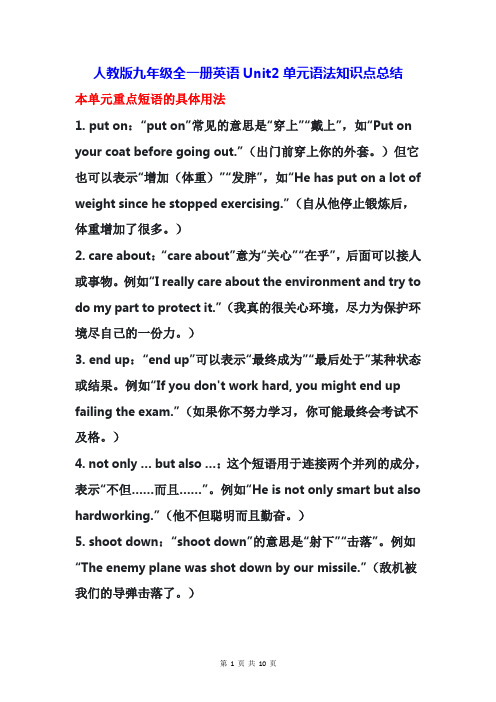
人教版九年级全一册英语Unit2单元语法知识点总结本单元重点短语的具体用法1. put on:“put on”常见的意思是“穿上”“戴上”,如“Put on your coat before going out.”(出门前穿上你的外套。
)但它也可以表示“增加(体重)”“发胖”,如“He has put on a lot of weight since he stopped exercising.”(自从他停止锻炼后,体重增加了很多。
)2. care about:“care about”意为“关心”“在乎”,后面可以接人或事物。
例如“I really care about the environment and try to do my part to protect it.”(我真的很关心环境,尽力为保护环境尽自己的一份力。
)3. end up:“end up”可以表示“最终成为”“最后处于”某种状态或结果。
例如“If you don't work hard, you might end up failing the exam.”(如果你不努力学习,你可能最终会考试不及格。
)4. not only … but also …:这个短语用于连接两个并列的成分,表示“不但……而且……”。
例如“He is not only smart but also hardworking.”(他不但聪明而且勤奋。
)5. shoot down:“shoot down”的意思是“射下”“击落”。
例如“The enemy plane was shot down by our missile.”(敌机被我们的导弹击落了。
)6. used to do:“used to do”表示过去常常做某事,但现在不再这样做了。
例如“I used to play basketball every day, but now I don't have time for it.”(我过去常常每天打篮球,但现在没有时间了。
- 1、下载文档前请自行甄别文档内容的完整性,平台不提供额外的编辑、内容补充、找答案等附加服务。
- 2、"仅部分预览"的文档,不可在线预览部分如存在完整性等问题,可反馈申请退款(可完整预览的文档不适用该条件!)。
- 3、如文档侵犯您的权益,请联系客服反馈,我们会尽快为您处理(人工客服工作时间:9:00-18:30)。
Unit 2 I think that mooncakes are delicious!一、词汇与短语◆重点单词A部分1.mooncake 月饼n.2.lantern 灯笼n.3.stranger 陌生人n.4.relative 亲属;亲戚n.5.pound 磅(重量单位);英镑(英国货币单位) n.6.folk 民间的;民俗的adj. 7.goddess 女神n.8.whoever 无论谁;不管什么人pron. 9.steal 偷;窃取v.10.lay 放置;安放;产(卵);下(蛋) v. 11.dessert (饭后)甜点;甜食n.12.garden 花园;园子n. 13.tradition 传统n.14.admire 欣赏;仰慕v.15.tie 领带n. 捆;束v.B部分1.haunted 有鬼魂出没的;闹鬼的adj.2.ghost 鬼;鬼魂n.3.trick 花招;把戏n.4.treat 款待;招待n. 招待;请(客)v. 5.spider 蜘蛛n.6.Christmas 圣诞节n.7.lie 存在;平躺;处于v.8.novel (长篇)小说n.9.eve 前夕;前夜n.10.dead 死的;失去生命的adj. 11.business 生意;商业n.12.punish 处罚;惩罚v.13.warn 警告;告诫v.14.present 现在;礼物n. 现在的adj. 15.warmth 温暖;暖和n.16.spread 传播;展开v. 蔓延;传播n.◆重点短语A部分1.put on增加(体重);发胖2.sound like……听起来像……3.the hottest month of the year 一年中最热的月份4.call out one's name to……对着……喊出某人的名字5.be similar to……和……相似6.throw……at……朝……扔……7.wash away 冲洗掉8.in the shape of……以……的形状9.carry sth. to sb. 把某物带给某人10.shoot down 射掉11.plan to do sth.计划做某事12.refuse to do sth. 拒绝做某事13.fly up to……飘向……14.from……to……从……到……15.lay out摆开;布置16.share……with……和……分享……17.come/be/get back 回来18.give sth. to sb. 给某人某物19.take sb. out for dinner 带某人出去吃晚饭20.help (to) do sth. /help with sth. 帮助做某事B部分1.dress up打扮;装扮2.trick or treat 不招待就使坏3.learn about 了解4.think of/think about 想到;考虑5.the true meaning of………的真正意义6.the importance of…………的重要性7.a novel written by…………写的小说8.care about 关心9.used to do sth. 过去常常做某事10.warn sb. to do sth. 告诫某人去做某事11.end up最终成为;最后处于12.expect sb. to do sth. 期待某人做某事13.take sb. back to sp. 把某人带回到某地14.wake up 醒来15.remind sb. of sth. /sb.使某人想起某物/16.decide to do sth. 决定做某事某人17.change one's life改变某人的生活18.promise to do sth. 承诺做某事19.in need需要20.treat sb. with……用……招待某人21.the beginning of…………的开端22.give birth to life 孕育新生命23.a symbol of…………的象征24.not only…but also…不但…而且…25.spread……around 到处传播……26.give out 分发◆重点句子A部分1.比尔想知道他们明年是否可以再吃到粽子。
Bill wonders whether they'll have zongzi again next year.2.但我认为四月份是那里一年中最热的月份。
But I believe that April is the hottest month of the year there.3.我想知道它是否与傣族的泼水节相似……I wonder if it's similar to the Water Festival of the Dai people……4.人们到街上互相泼水。
People go on the streets to throw water at each other.5.然后你将在新的一年里交好运。
Then you'll have good luck in the new year.6.我相信有很多种方式可以表达我们的爱。
I believe that there are many ways to show our love.7.What a great day! 多棒的一天!8.Bill thinks that the races were not that interesting to watch.比尔认为那些比赛观看起来并不那么有趣。
9.How he wished that Chang'e could come back!他是多么希望嫦娥能够回来啊!10.How pretty the dragon boats were! 这些龙舟多么漂亮啊11.I heard that it is becoming more and more popular to celebrate Mother's Day and Father's Day in China. 我听说在中国庆祝母亲节和父亲节正变得越来越流行。
B部分1.吴瑜认为这个节日怎么样?What does Wu Yu think of this festival?2.《圣诞欢歌》是由查尔斯•狄更斯写的一部著名的短篇小说。
A Christmas Carol is a famous short novel written by Charles Dickens.3.马利以前就和斯克鲁奇一样,因此他死后受到了惩罚。
Marley used to be just like Scrooge,so he was punished after he died.4.人们不仅为了复活节寻找彩蛋游戏而将彩蛋分散到周围不同的藏匿处,而且他们还分发这些好吃的作为礼物。
Not only do people spread them around in different hiding places for an egg hunt, but they also give out these treats as gifts.5.并使斯克鲁奇想起了他小时候更快乐的时光。
and reminds Scrooge of his happier days as a child.6.他是如此害怕以至于他在自己的床上醒来.He is so scared that he wakes up in his bed.7.他高兴地和亲戚们一起庆祝圣诞节。
He happily celebrates Christmas with his relatives.◆重点单词变形A部分1.lay—laid(过去式)—laid(过去分词)2.tradition—traditional(形容词) 3.fly—flew(过去式)4.shoot—shot(过去式) 5.stranger—strange(形容词)B部分1.warm—warmth (名词)2.haunt—haunted (形容词) 3.dead—die (动词)—death (名词)4.lie—lay (过去式)—lain (过去分词)二、语法知识点A部分知识点1.宾语从句★宾语从句是一种名词性从句。
名词性从句,不难理解,在句子中起名词作用的句子叫名词性从句,名词性从句相当于一个“大个单词”的名词,名词在句子中担任主语、宾语、表语、同位语,因此根据它不同的语法功能(位置关系),又可分别称为主语从句、宾语从句、表语从句和同位语从句。
从属连词+句子=从句名词性从句宾语从句,主语从句,表语从句,同位语从句形容词性从句定语从句副词性从句状语从句要想了解宾语从句,那首先要知道什么是宾语。
简单的说,宾语就是动作的承受者或者动作的对象,宾语一般放在动词、介词后。
eg:Jim like him. 吉姆喜欢他。
(这里的him就是宾语)The boy is playing basketball. 那个男孩正在打篮球。
(这里的basketball就是宾语) look at me. 看看我。
(这里的me就是宾语)listen to me. 听我说。
(这里的me也是宾语)因此我们看出宾语一般放在动词、介词后。
如果这个宾语用句子来替代了,这个句子就叫宾语从句。
所以宾语从句通常放在主句谓语动词(及物动词)或介词之后。
eg:I think every home will have a robot.我认为每家都将会有一个机器人。
I think the boy will buy a few new books about English.我认为这个男孩儿将会买一些英语方面的新书。
Tell your son that watching TV too much is bad for his eyes.(直接宾语被句子替代)告诉你儿子,看太多电视对他的眼睛不好。
It all depends on whether it will be fine tomorrow. (作介词on的宾语)所有一切都取决于明天的天气是否晴朗。
★ 宾语从句的分类宾语从句根据引导词的不同可分为三种类型。
❶陈述句中的宾语从句陈述句一般都用that引导,从属连词that无实际意义,不在从句中充当任何成分。
此时宾语从句的成分齐全,句意明确。
在口语和非正式文体中that可以省略,宾语从句的语序为陈述语序。
eg:He is a shy girl.I think.→I think (that) he is a shy girl. 我认为他是个害羞的女孩。
